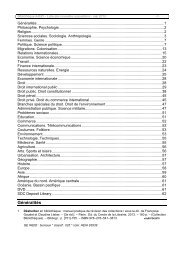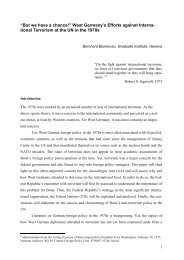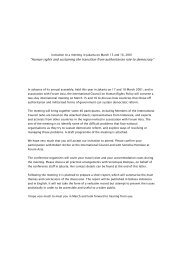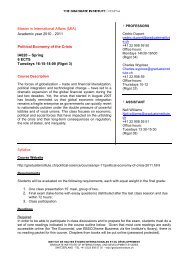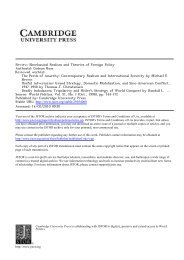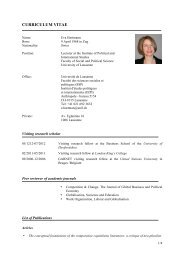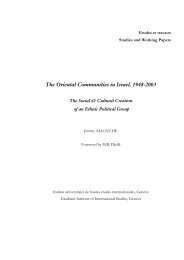Extending International Criminal Law beyond the Individual to ...
Extending International Criminal Law beyond the Individual to ...
Extending International Criminal Law beyond the Individual to ...
You also want an ePaper? Increase the reach of your titles
YUMPU automatically turns print PDFs into web optimized ePapers that Google loves.
<strong>Extending</strong> <strong>International</strong> <strong>Criminal</strong> <strong>Law</strong> 925<br />
reciprocity, effectiveness, <strong>the</strong> needs of <strong>the</strong> international community, succession<br />
<strong>to</strong> state obligations through effective exercise of sovereignty, purported representation<br />
of legislative jurisdiction by national authorities, and a plain text<br />
reading of treaty provisions such as common Article 3 <strong>to</strong> <strong>the</strong> Geneva Conventions<br />
of 1949. 79 But writing in his authoritative Handbook of <strong>International</strong><br />
Humanitarian <strong>Law</strong>, Dieter Fleck has simply suggested that <strong>to</strong> ask how armed<br />
opposition groups can be bound by international law is ‘overly complicating<br />
a fundamental principle: international treaties are not concluded on behalf<br />
of governments, but on behalf of states lawfully representing all <strong>the</strong>ir<br />
citizens. Cus<strong>to</strong>mary international law is based on practice and opinio iuris of<br />
states and binding upon peoples. General principles of law have likewise binding<br />
effects upon individuals’. 80 The same Handbook includes <strong>the</strong> assertion by<br />
Chris<strong>to</strong>pher Greenwood that:<br />
The obligations created by international humanitarian law apply not just <strong>to</strong> states but<br />
<strong>to</strong> individuals and <strong>to</strong> non-state ac<strong>to</strong>rs such as a rebel faction or secessionist movement<br />
in a civil war. The application <strong>to</strong> non-state ac<strong>to</strong>rs of human rights treaties is more<br />
problematic and even if <strong>the</strong>y may be regarded as applicable in principle, <strong>the</strong> enforcement<br />
machinery created by human rights treaties can normally be invoked only in proceedings<br />
against a state. 81<br />
The obligations on states and non-state ac<strong>to</strong>rs are by no means identical,<br />
but we can see that such commentary ra<strong>the</strong>r suggests that first, we no longer<br />
need <strong>to</strong> search for a <strong>the</strong>oretical foundation for fixing international obligations<br />
on armed opposition groups; and second, <strong>the</strong> obligations are not limited<br />
<strong>to</strong> international humanitarian law but can be expressed in terms of international<br />
criminal law. 82 If it is admitted that human rights law may apply<br />
in principle, it is difficult <strong>to</strong> see why one would exclude international<br />
Rebels under <strong>the</strong> 1977 Geneva Pro<strong>to</strong>col on Non-<strong>International</strong> Armed Conflicts’, 30 <strong>International</strong><br />
and Comparative <strong>Law</strong> Quaterly (1981) 416^439.<br />
79 On Common Art. 3, see UK Ministry of Defence,TheManualof<strong>the</strong><strong>Law</strong>ofArmedConflict(Oxford:<br />
Oxford University Press, 2004), 385, esp. note 19: ‘This purports <strong>to</strong> bind all parties, both states<br />
and insurgents, whe<strong>the</strong>r or not <strong>the</strong> latter have made any declaration of intent <strong>to</strong> apply <strong>the</strong><br />
principles.’<br />
80 D. Fleck (ed.), ‘The <strong>Law</strong> of Non-<strong>International</strong> Armed Conflicts’, in The Handbook of Humanitarian<br />
<strong>Law</strong> in Armed Conflict (2nd edn., Oxford: Oxford University Press, 2007), 603^633, at 608. See<br />
also D. Fleck,‘Humanitarian Protection Against Non-State Ac<strong>to</strong>rs’, in J.A. Frowein, K. Scharioth,<br />
I. Winkelmann and R. Wolfrum (eds), Verhandeln fu«r den Frieden - Negotiating for Peace: Liber<br />
Amicorum Tono Eitel (Berlin: Springer, 2003), 69^94.<br />
81 ‘Scope of Application of Humanitarian <strong>Law</strong>’, in Fleck (ed.), supra note 80, 45^78 at 76. See also<br />
Institute de Droit <strong>International</strong>, ‘L’application du droit international humanitaire et des droits<br />
fondamentaux de l’homme dans les conflits arme¤s auxquels prennent part des entite¤s none¤tatiques:<br />
re¤solution de Berlin du 25 aou“ t 1999’ (commentary by Robert Kolb) (Paris: Pedone, 2003).<br />
82 ‘As for punishing violations, international criminal law is as applicable <strong>to</strong> those fighting for<br />
armed groups as <strong>to</strong> those fighting for states. Armed groups are responsible for violations<br />
committed by <strong>the</strong>ir members. Their responsibility <strong>to</strong> <strong>the</strong> international community has already<br />
been demonstrated by sanctions imposed on <strong>the</strong>m by <strong>the</strong> Security Council.’ M. Sasso' li,<br />
‘Engaging Armed Nonstate Ac<strong>to</strong>rs with <strong>International</strong> Humanitarian <strong>Law</strong>’, 6 Human Security<br />
Bulletin (2008) 15^18.



![Download [pdf] - The Graduate Institute, Geneva](https://img.yumpu.com/23370020/1/190x248/download-pdf-the-graduate-institute-geneva.jpg?quality=85)
